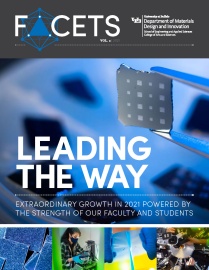Free talk explores the hidden bias of our AI-assisted world
Release Date: February 14, 2023
BUFFALO, N.Y. – Are robots racist? The University at Buffalo Center for Information Integrity (CII) will address that question in a panel discussion on Feb. 18 at 12 p.m. at the Buffalo Museum of Science that explores the hidden bias of our artificial intelligence-assisted world.
The event is free open to the public.
AI is at work in apps that provide directions. It has a hand in matching passengers to ride shares. It has a search engine presence when we need suggestions or rankings for books, music, podcasts or whatever else we might be trying to find or determine. Its influence is felt over a range of topics and experiences from minor to monumental.
The output is often helpful, but is it fair? AI does well in some areas, but it also falls alarmingly short in others.
A panel of local and regional scholars will approach this fairness question from different disciplinary angles as they discuss the ethical and social justice implications of AI automation in a discussion moderated by David Castillo, PhD, UB professor of Romance languages and literatures and co-director of CII.
“As we travel deeper into our digital age increasingly run by AI tools, it is important to think about the consequences of largely unsupervised algorithms making life-altering decisions in such matters as loan and college applications, the allocation of public resources, policing, sentencing, health care, or even the information that populates our social media newsfeeds,” says Castillo. “Our panel will encourage reflection and inspire further conversion on the issues associated with outsourcing decision-making processes to machines.”
The CII is rooted in the shared conviction that accurate information is required for vigorous public debate and democracy. The center is devoted to the identification, amelioration, and combatting of dis- and misinformation that pollutes the public sphere. CII members take on this existential threat from multidisciplinary approaches derived from fields as varied as history, literature, art, media study, information science, psychology, computer engineering, political science, geography, communication, law, and biomedical sciences.
Who: An expert panel organized by UB’s Center for Information Integrity
- David Castillo, PhD, UB professor of Romance languages and literatures and co-director of CII (moderator)
- E. Bruce Pitman, PhD, UB professor of materials design and innovation
- Mark Shepard, PhD, UB professor of architecture and media study
- Jasmina Tacheva, PhD, Syracuse University assistant professor of comparative literature
- Ewa Plonowska Ziarek, PhD, Julian Park Professor of comparative literature at UB.
What: Panel discussion on the ethical and social justice implications of AI
Where: Buffalo Museum of Science, 1020 Humboldt Parkway
When: Feb. 18, from 12 to 1:30 p.m.
Cost: Free for the panel discussion. Guests may pay admission to explore the museum and its special exhibit, “Reinventing Reality,” before or after the program.
Media Contact Information
Bert Gambini
News Content Manager
Humanities, Economics, Social Sciences, Social Work, Libraries
Tel: 716-645-5334
gambini@buffalo.edu

